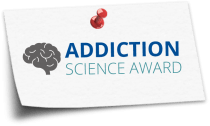What is the Addiction Science Award?

Every May, the Addiction Science Award, coordinated by the Friends of NIDA, a coalition that supports NIDA's mission, is given to three exemplary projects on the topic of addiction science during the International Science and Engineering Fair (ISEF). The ISEF is the world's largest science competition for high school students.
First place winner receives $2500, second place winner receives $1500 and third place winner receives $1000. The Addiction Science winners are announced at the Special Awards ceremony at the Fair, and we invite them to visit the National Institutes of Health (NIH) in Bethesda, Maryland, later that summer.
How to Get Students Excited About the Science Fair
The ISEF science fair gives students a chance to direct their own learning by doing. It is the perfect platform to support and showcase the value of science- and project-based learning for future academic success.
Encouraging students to participate and getting them excited about the work ahead begins with a project that is stimulating and evidence-based. Guide students toward ideas that allow them to become part of the scientific process. Help them see how science concepts can be applied to their everyday lives. If they are having trouble coming up with a research question, have them do some journaling about their school and home life, noting what drug use, discussions, and behaviors they see from friends, family, and even strangers.
For example, one NIDA award winner used his own ADHD diagnosis as a starting point for a project on ADHD; another used his love of video games to do a project on how to measure if you might be addicted to gaming. Another winner was curious to know how stressful it would be if teens were separated from their cell phones, and built a project around it.
Finally, use examples of compelling projects from previous science fair winners. Here is just a sampling to give students a sense of the range of ideas available to them:
- Screen time and mood, memory and cognition. Zarin’s a high school junior from South Dakota, concluded that excessive screen time with computers, phones and other electronic devices serves as a stressor ultimately affecting mood, academic performance and poor decision making.
- Effects of e-cigarette vapor on lung cells. Ralph looked at the toxicological effects of e-cigarette vapor on lung cell viability and inflammation. His project suggests that tobacco vapor can be just as damaging to lung cells as traditional cigarette smoke.
- Multitasking and risky behaviors. Alexandra and Sarayu, both from Portland, explored whether multitasking affects behaviors controlled by the prefrontal cortex, an area involved in self-control that is negatively impacted by drug use.
- Self image, self esteem, eating disorders, steroid use, and dietary supplement use. Elisabeth conducted a survey of nearly 200 teenagers to determine how their internal self image and self esteem affected eating disorders, steroid use, and potentially dangerous use of dietary supplements.past Addiction Science Award winners, all begun with a simple question and ended with an important discovery.
Safety/Privacy Guidelines
Students must follow safety and privacy guidelines as outlined through the International Science and Engineering Fair (ISEF) rules. Some projects, particularly those involving human subjects (including interviews and surveys) may require pre-approval. See the ISEF Rules to learn more.
